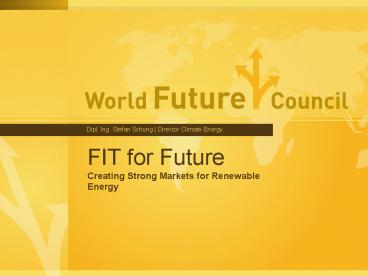PowerPointPrsentation - PowerPoint PPT Presentation
1 / 46
Title: PowerPointPrsentation
1
Dipl. Ing. Stefan Schurig Director Climate
Energy
FIT for Future Creating Strong Markets for
Renewable Energy
2
Who we are
an international green think tank (The
Economist)
a pressure group (The Guardian)
the Club of Rome with a campaign department
(Jakob Uexküll)
2
3
Who we are
- The World Future Council
- consists of fifty highly respected figures
represented in governments, civil society,
business, science, education and the arts
from all five continents - is an integrated global forum based on mutual
ethical values, highlighting our
responsibilities as citizens of the earth - strives to mobilise moral energy and political
will to protect the rights of future
generations
3
4
Providing Policy Solutions
- The Council
- works closely with policy-makers and civil
- societies
- identifies, develops and helps to implement
Best - Policies
- provides concrete solutions to key
environmental, - social and economic issues
- turns the focus towards climate change as an
- overarching issue special focus on
renewables
4
5
Climate impact of industrilisation
5
6
6
7
7
8
World by night
8
9
Per capita CO2 emissions in 2004
9
10
Dynamic of change
Increasing Energy demand Energy costs CO2
emissions and pollution Sea levels Health
costs Climate instability
Decreasing Fossil fuel reserves Biodiversity Natu
ral resources Rural populations Faith in
governments Time left for action
10
11
Quo vadis?
11
12
Three Pathways to sustainable energy
- Increase energy efficiency and energy saving
- Development renewable energy sector (national and
international) - Creating an intelligent allocation grid
12
13
Promoting Renewable Energy through Feed in
tariffs (FIT)
13
14
What matters when pushing renewable energy in the
markets
Factors of influence on the deployment of
renewable energy
14
15
Feed in legislation
-makes RE electricity priority -Obliges grid
operators to purchase electricity from RES -Sets
the price for RE electricity for fixed periods
and gives investment security -Sets no limit to
amount of RE feeding into the grid
15
16
Corefeatures
- ACCESS
- Ensuring connection to the grid
- Extending and reinforcing the grid
- Costs of connecting need to be paid by the
supplier - Transparency need to be secured
16
17
Corefeatures
- PRICE
- Technologies and plant need to be covered
- Imposing a priority purchase obligation
- Tariff must be adjusted to the state of
development of the technology - Combination with other mechanisms
17
18
Financing of Feed in tariffs
Via a national fund or state budget through CDM
or other UN- mechanisms
18
19
Financing of Feed in tariffs
Via all electricity consumers
19
20
Comparison of Quota-System vs. Feed- in system
21
(No Transcript)
22
22
23
23
24
(No Transcript)
25
Achievements in Germany within only six years
- 250,000 jobs created
- 40 million tonnes of CO2 saved directly from EEG
- 97 million tonnes of CO2 saved overall in Germany
- 11.8 share of final electricity consumption from
RES achieved - 21.6bn turnover in 2006 for German RE companies
- 8.7bn investment per year
- Reduction of around 5.40 worth of environmental
damage per household per month - All this, at a cost of only around 1 per
household per month!
25
26
Empowerment of policymakrers
26
27
www.onlinepact.org
27
28
Contains all inforamtion
28
29
29
30
30
31
31
32
to the first draft!
32
33
Proposal for island communities
Creating an alliance of islands for renewable
energy (AIRE) Target combat climate change and
ensure climate justice Targetgroup
Industrialised countries UN (internationally)
33
34
Proposal for island communities
Acting internationally and nationally! -Raise
the voice at the UNFCCC conferences -Taking
national actions and ignite a national renewable
energy sector
34
35
We have the responsibility for future
generationslets be smart!
35
36
Thank you for your kind attenttion!
37
Pros and cons of the Quota-System and Feed in law
- Pros
- Promote least cost projects cheapest resource
used first which brings cost down early on - Theoretically provide certainty regarding future
market share for renewable energy - Perceived as being more compatible with open or
traditional power markets - More likely to fully integrate renewables into
electricity supply infrastructure
37
38
Pros and cons of the Quota-System and Feed in law
- Cons
- High risk and low rewards for equipment
manufactores and project developers - Price flucutuation in thin markets, cretaing
instability and gaming - Tend to favour large, centralized merchant plants
and not suited for small investors due to grester
investment risk - Concentrate development in areas with best
resources, causing possible opposition to
projects and missing many of the benefits
associated with Renewable energy - Targets can set upper limits for developments
there are no high profits to serve as incentives
to install more than the mandated level becuase
profitibility exists only within the quota - Tends to create cycles to stop and go development
- Complex in design, administration and
enforcement, leading to a lack of transparency - High transaction costs
- Lack flexibility difficult to fine-tune or
adjust i short termn
38
39
We have the responsibility for future
generationslets be smart!
39
40
C
40
41
Climate change is a question of global justice
41
42
Climate Change an increasing cause of
foodemergency
42
43
Top 5 countries in RE
Source Global Status Report 2006
44
Comparison of support schemes
Tradable certificates vs FITs
Source Haas et al 2006
45
The greenhouse effect
46
(No Transcript)































